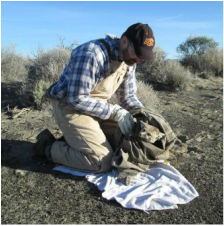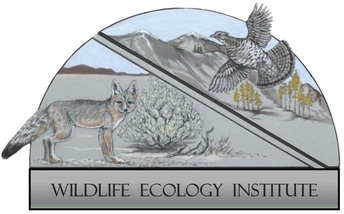Wildlife Ecology Institute
The Wildlife Ecology Institute is a 501(c)(3) non-profit organization with the goal of addressing contemporary wildlife conservation and management issues in an increasingly complex and technical field through our research efforts. We value the development of strong partnerships with local, state, and federal wildlife and land-management agencies (and other organizations) to cooperatively define project objectives and collaborate throughout the process. Consequently, the mission of the Institute is modeled to directly address issues commonly faced by agencies. The value of our work includes an increase in informed and defensible decisions to apply to management, conservation, and policy.
Mission:
Advance wildlife management and conservation through applied research
and educational activities.
Advance wildlife management and conservation through applied research
and educational activities.
This Institute was formed in response to the substantial and increasing need for quality research that directly addresses real-world management issues. This need has arisen because wildlife departments at many academic institutions have undergone a paradigm shift away from applied research focused on solving management issues. This shift has also resulted in an increasing lack of management expertise and understanding in academia necessary to train our future wildlife managers. Although there certainly are exceptions, collaborative partnerships between many agencies and academic faculty have become strained or dissolved over time because of differing perspectives and backgrounds. Several agencies have strong in-house research programs, but logistics, staffing, and other constraints exist such that not all research priorities can be addressed as they arise. We are very supportive of our collaborative partnerships with agency biologists, other non-profit organizations, and academic scientists with a strong desire to pursue applied research that supports our mission.
Our team desires to continue to develop long-term professional partnerships and work directly with agencies to meet their needs, a novel approach for a non-profit research organization. The diverse experience within the Wildlife Ecology Institute, including my experience as a former state agency biologist, makes the Institute well positioned and motivated to effectively meet all of these challenges, both in research and with training our future professionals for the challenges faced by agencies.
Please feel free to contact us about wildlife research and education and to check our potential attendance at any state, national, or international meetings and conferences to meet us in-person. Please click here if you wish to make a charitable donation - we appreciate your support!

Tim L. Hiller, Ph.D.
Certified Wildlife Biologist® Executive Director and Founder Wildlife Ecology Institute P.O. Box 4725 Helena, MT 59604 USA Phone: 971-209-8005 Email: [email protected] Tim's curriculum vitae |
Copyright 2024 Wildlife Ecology Institute
